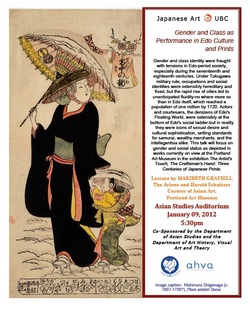
"Gender and Class as Performance in Edo Culture and Prints"
Lecture by MARIBETH GRAYBILL
The Arlene and Harold Schnitzer
Curator of Asian Art,
Portland Art Museum
at the UBC Asian Studies Auditorium
January 09, 2012
5:30pm
Co-Sponsored by the Department of Asian Studies and the Department of Art History, Visual Art and Theory
Gender and class identity were fraught with tensions in Edo-period society,
especially during the seventeenth and eighteenth centuries. Under Tokugawa
military rule, occupations and social identities were ostensibly hereditary and
fixed, but the rapid rise of cities led to unanticipated fluidity-no where more so
than in Edo itself, which reached a population of one million by 1720. Actors
and courtesans, the denizens of Edo's Floating World, were ostensibly at the
bottom of Edo's social ladder-but in reality they were icons of sexual desire and
cultural sophistication, setting standards for samurai, wealthy merchants, and the
intellegentsia alike. This talk will focus on gender and social status as depicted in
works currently on view at the Portland Art Museum in the exhibition The Artist's
Touch, The Craftsman's Hand: Three Centuries of Japanese Prints.
 RSS Feed
RSS Feed
